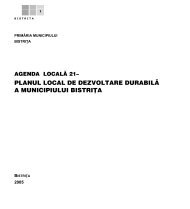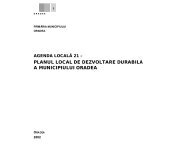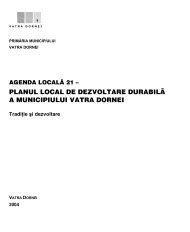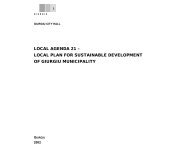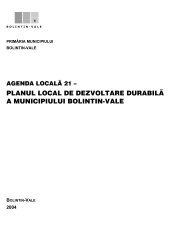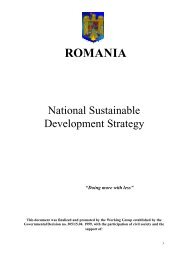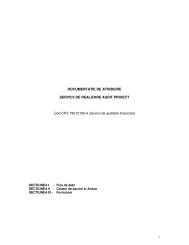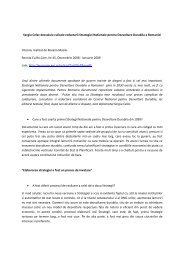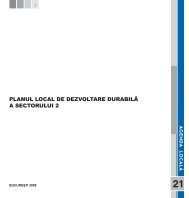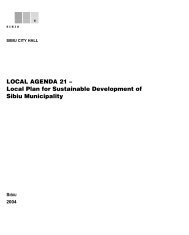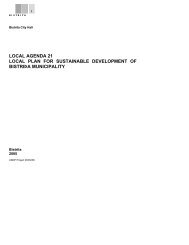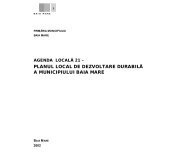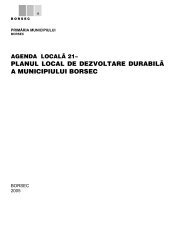local agenda 21 local plan for sustainable development for the ...
local agenda 21 local plan for sustainable development for the ...
local agenda 21 local plan for sustainable development for the ...
You also want an ePaper? Increase the reach of your titles
YUMPU automatically turns print PDFs into web optimized ePapers that Google loves.
49<br />
MEDGIDIA<br />
III. LOCAL ACTION PLAN FOR SUSTAINABLE<br />
DEVELOPMENT<br />
III.1. GENERAL CONSIDERATIONS<br />
The Local Action Plan, as a <strong>plan</strong>ning and implementation<br />
tool, includes a set of policies by domains of activity,<br />
applied over a defined period of time, aiming to achieve <strong>the</strong><br />
general objectives established by a strategy. The achievement<br />
of <strong>the</strong> Local Action Plan should cover <strong>the</strong> period of 10-<br />
20 years, a time period established <strong>for</strong> <strong>the</strong> implementation<br />
of <strong>the</strong> Local Strategy <strong>for</strong> Sustainable Development.<br />
The Local Action Plan should be periodically revised, so<br />
that <strong>the</strong> established targets take into account <strong>the</strong> macroeconomic<br />
evolution at <strong>the</strong> national level, <strong>the</strong> state of <strong>the</strong><br />
<strong>local</strong> and regional economy, and <strong>the</strong> <strong>local</strong> community<br />
opinions regarding its implementation. Frequent revisions<br />
lead to fewer errors in evaluating <strong>the</strong> resources of a project,<br />
knowing that <strong>the</strong> variables that characterise <strong>the</strong> analysed<br />
socio-economic system (<strong>the</strong> city) are multiplying in time.<br />
For this reason, we propose to review <strong>the</strong> Local Action<br />
Plan included in Local Agenda <strong>21</strong> every two years, even<br />
if this is designed <strong>for</strong> ten year period.<br />
III.2. PRINCIPLES AND CONDITIONS<br />
The Local Action Plan addresses <strong>the</strong> <strong>local</strong> community of<br />
Medgidia and <strong>the</strong> measures, <strong>the</strong>ir number and prioritisation<br />
(probably <strong>the</strong> most sensible item of <strong>the</strong> Local Action Plan<br />
content), as well as <strong>the</strong> institutional mechanism <strong>for</strong><br />
implementation take into account <strong>the</strong> interests of <strong>the</strong> <strong>local</strong><br />
community (business community, trade unions, charitable<br />
associations and foundations, cultural associations,<br />
organisations <strong>for</strong> protecting <strong>the</strong> cultural and architectural<br />
heritage, <strong>the</strong> environment, animals, and religious<br />
congregations).<br />
The measures included in <strong>the</strong> Local Action Plan are<br />
grouped in programmes, sub-programmes and projects<br />
and are designed in accordance with <strong>the</strong> following aspects:<br />
• Correlation between <strong>the</strong> targets established in<br />
programmes, sub-programmes, projects and <strong>the</strong> general<br />
objectives included in <strong>the</strong> Local Strategy <strong>for</strong> Sustainable<br />
Development;<br />
• Limited financial resources, that influence <strong>the</strong> funding<br />
methods and legal mechanisms which <strong>the</strong> programmes,<br />
sub-programmes and projects are based on (i.e. bank<br />
credit, <strong>for</strong>eign loan, city bonds, concession, sale, rent,<br />
public-private partnership based on concession, sale or<br />
o<strong>the</strong>r type of contract etc.);<br />
• Avoid <strong>the</strong> eviction effect (in economic understanding),<br />
meaning that in <strong>the</strong> conditions of limited resources an<br />
increase of public expenditures results in a decrease in <strong>the</strong><br />
consumption or private investments. The public authority<br />
should permanently evaluate <strong>the</strong> opportunity of an<br />
investment, not only from <strong>the</strong> point of view of its current<br />
financial resources, but also from future resources, as well<br />
as <strong>the</strong> population’s options, so that <strong>the</strong> community and<br />
individual responsibility be encouraged, as well as <strong>the</strong><br />
partnership established <strong>for</strong> <strong>the</strong> implementation of a <strong>local</strong><br />
<strong>development</strong> project;<br />
• Public awareness of a programme, sub-programme,<br />
project through in<strong>for</strong>mation dissemination among <strong>the</strong> <strong>local</strong><br />
community. In this respect, <strong>the</strong> Local Action Plan should<br />
include <strong>the</strong> mechanism of public debate within <strong>the</strong> analysis<br />
of <strong>the</strong> programmes, sub-programmes and projects to be<br />
implemented;<br />
• Involvement of <strong>the</strong> interested parties in <strong>the</strong> implementation<br />
of a programme, sub-programme or project;<br />
• Regulation versus self-regulation norms. The <strong>local</strong> authority<br />
shall take into consideration that in some situations <strong>the</strong><br />
non-profit organisations or business community<br />
associations can voluntarily establish <strong>the</strong>ir regulations <strong>for</strong><br />
<strong>the</strong> <strong>development</strong> of a certain project without <strong>the</strong> intervention<br />
(through regulations) of <strong>the</strong> public authority. That is why it is<br />
preferable to avoid over-regulation. It is also possible that



